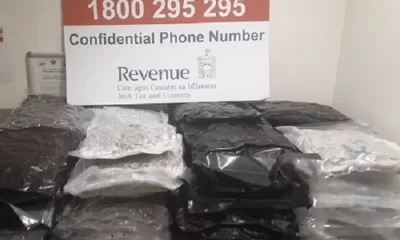Cultivation
New Zealand Leaders Demand Cops Stop Spraying Chemicals on Cannabis

New Zealand cops are spraying weird blue chemicals on weed plants. Is it safe to humans and surrounding foliage?
New Zealand’s recently revived cannabis eradication has gotten out of control, residents say. A couple growing three weed plants last February, for instance, were having dinner together when a helicopter flew overhead, spraying chemicals onto their three weed plants that they used for medical reasons.
The program isn’t settling well in the modern world—not at a time when nearly 70% of New Zealanders support legalization or decriminalization. Both leaders and residents are fed up with the waste of resources as the country races toward cannabis reform.
Legalization backer and Green MP Chlöe Swarbrick said spraying cannabis plants from helicopters isn’t the way to solve this. Last February, the New Zealand Police National Headquarters made the decision to revive its cannabis eradication program, which was canceled in January 2021.
“But obviously, we have an incredibly ineffective law when this amount of money is being continually spent on an annual basis, and making no effect on the supply on the streets,” Swarbrick told Stuff.co.nz yesterday.
Instead, Swarbrick suggested focusing on a real problem the country is grappling with—such as meth. On June 9, the New Zealand customs issued a news release that they had uncovered “435 grams of methamphetamine, approximately $455,000 in cash, and clan lab-related items.”
New Zealand Drug Foundation executive director, Sarah Helm, agreed that the police policies don’t align with what is happening across the country. “Nearly half of the country voted for full legalization of cannabis in the 2020 referendum,” Helm said. “Polling commissioned last year by The Helen Clark Foundation found 69 per cent of New Zealand respondents supported either full legalisation or decriminalisation of cannabis.”
According to uncovered documents provided to Waikato Times under the Official Information Act of New Zealand, the country spent $2,653,878 on aerial spraying cannabis nationally over the past five years. Locals are fed up that over $2.6 million was spent on destroying what the majority of the country supports.
Over 48% of New Zealander voters said they support legalizing cannabis in a referendum held last year. A poll conducted by market research firm UMR for the Helen Clark Foundation found an additional 20%, give or take, voted no but said they think cannabis should be decriminalized, bringing the total to 69%.
What the F*** are Cops Spraying on Weed?
So what exactly are cops spraying on weed? A journalist from Te Ao Māori News also wanted to know in 2018.
Officers were asked what substances they were using and one officer told Te Ao Māori News “nothing, just dye and water.” But local resident Whetu Paitai caught cops in the act, pouring a mysterious blue liquid onto the beach, and posted a video on Facebook. It turns out it’s the same herbicide they’re using to kill weed plants.
“I took a photo of the container and Googled them to find they were a weed killer called Bio-Safe from AGPRO,” Paitai said. “They have a hazchem code of 2XE which means any waste material is to be contained and removed to be correctly disposed of, as opposed to material that you can just dilute down,”
According to AGPRO Bio-Safe’s Safety Data Sheet (SDS), it can harm aquatic life with “long lasting effects,” and it is classified a poison despite being produced using natural ingredients.
A police spokesperson claimed the spray used only affects plants and has no major impact on the soil. “A blue marker dye, which is non-toxic and environmentally safe, is used to alert growers to the fact that a plant has been sprayed,” the spokesperson said in a statement.
We can learn from the past when it comes to herbicides. When U.S.-funded cannabis eradication programs in Mexico (and other countries) in the 1970s used the dangerous herbicide paraquat, the weed made its way back into the United States where it ended up harming Americans.
In March 1978, 21% of marijuana samples surveyed from the southwestern United States were found to be contaminated with paraquat. A recent study on paraquat poisoning in 2020 shows that “the in-hospital mortality rate was 72.7%” of people surveyed, with “acute kidney injury” being the major reason. It is also believed to cause Parkinson’s.
There are dangerous effects of smoking pesticides, herbicides, and fungicides (in legal operations, especially myclobutanil). On top of that, herbicides can harm foliage, shoots, flowers, and fruits—and the spray gets everywhere. Lab-tested legal weed is typically tested for contaminants like those. There must be better ways of mitigating illegal cannabis crops without spraying chemicals on them.
Source: https://hightimes.com/news/new-zealand-leaders-demand-cops-stop-spraying-chemicals-on-cannabis/
Business
New Mexico cannabis operator fined, loses license for alleged BioTrack fraud

New Mexico regulators fined a cannabis operator nearly $300,000 and revoked its license after the company allegedly created fake reports in the state’s traceability software.
The New Mexico Cannabis Control Division (CCD) accused marijuana manufacturer and retailer Golden Roots of 11 violations, according to Albuquerque Business First.
Golden Roots operates the The Cannabis Revolution Dispensary.
The majority of the violations are related to the Albuquerque company’s improper use of BioTrack, which has been New Mexico’s track-and-trace vendor since 2015.
The CCD alleges Golden Roots reported marijuana production only two months after it had received its vertically integrated license, according to Albuquerque Business First.
Because cannabis takes longer than two months to be cultivated, the CCD was suspicious of the report.
After inspecting the company’s premises, the CCD alleged Golden Roots reported cultivation, transportation and sales in BioTrack but wasn’t able to provide officers who inspected the site evidence that the operator was cultivating cannabis.
In April, the CCD revoked Golden Roots’ license and issued a $10,000 fine, according to the news outlet.
The company requested a hearing, which the regulator scheduled for Sept. 1.
At the hearing, the CCD testified that the company’s dried-cannabis weights in BioTrack were suspicious because they didn’t seem to accurately reflect how much weight marijuana loses as it dries.
Company employees also poorly accounted for why they were making adjustments in the system of up to 24 pounds of cannabis, making comments such as “bad” or “mistake” in the software, Albuquerque Business First reported.
Golden Roots was fined $298,972.05 – the amount regulators allege the company made selling products that weren’t properly accounted for in BioTrack.
The CCD has been cracking down on cannabis operators accused of selling products procured from out-of-state or not grown legally:
- Regulators alleged in August that Albuquerque dispensary Sawmill Sweet Leaf sold out-of-state products and didn’t have a license for extraction.
- Paradise Exotics Distro lost its license in July after regulators alleged the company sold products made in California.
Golden Roots was the first alleged rulebreaker in New Mexico to be asked to pay a large fine.
Source: https://mjbizdaily.com/new-mexico-cannabis-operator-fined-loses-license-for-alleged-biotrack-fraud/
Business
Marijuana companies suing US attorney general in federal prohibition challenge

Four marijuana companies, including a multistate operator, have filed a lawsuit against U.S. Attorney General Merrick Garland in which they allege the federal MJ prohibition under the Controlled Substances Act is no longer constitutional.
According to the complaint, filed Thursday in U.S. District Court in Massachusetts, retailer Canna Provisions, Treevit delivery service CEO Gyasi Sellers, cultivator Wiseacre Farm and MSO Verano Holdings Corp. are all harmed by “the federal government’s unconstitutional ban on cultivating, manufacturing, distributing, or possessing intrastate marijuana.”
Verano is headquartered in Chicago but has operations in Massachusetts; the other three operators are based in Massachusetts.
The lawsuit seeks a ruling that the “Controlled Substances Act is unconstitutional as applied to the intrastate cultivation, manufacture, possession, and distribution of marijuana pursuant to state law.”
The companies want the case to go before the U.S. Supreme Court.
They hired prominent law firm Boies Schiller Flexner to represent them.
The New York-based firm’s principal is David Boies, whose former clients include Microsoft, former presidential candidate Al Gore and Elizabeth Holmes’ disgraced startup Theranos.
Similar challenges to the federal Controlled Substances Act (CSA) have failed.
One such challenge led to a landmark Supreme Court decision in 2005.
In Gonzalez vs. Raich, the highest court in the United States ruled in a 6-3 decision that the commerce clause of the U.S. Constitution gave Congress the power to outlaw marijuana federally, even though state laws allow the cultivation and sale of cannabis.
In the 18 years since that ruling, 23 states and the District of Columbia have legalized adult-use marijuana and the federal government has allowed a multibillion-dollar cannabis industry to thrive.
Since both Congress and the U.S. Department of Justice, currently headed by Garland, have declined to intervene in state-licensed marijuana markets, the key facts that led to the Supreme Court’s 2005 ruling “no longer apply,” Boies said in a statement Thursday.
“The Supreme Court has since made clear that the federal government lacks the authority to regulate purely intrastate commerce,” Boies said.
“Moreover, the facts on which those precedents are based are no longer true.”
Verano President Darren Weiss said in a statement the company is “prepared to bring this case all the way to the Supreme Court in order to align federal law with how Congress has acted for years.”
While the Biden administration’s push to reschedule marijuana would help solve marijuana operators’ federal tax woes, neither rescheduling nor modest Congressional reforms such as the SAFER Banking Act “solve the fundamental issue,” Weiss added.
“The application of the CSA to lawful state-run cannabis business is an unconstitutional overreach on state sovereignty that has led to decades of harm, failed businesses, lost jobs, and unsafe working conditions.”
Business
Alabama to make another attempt Dec. 1 to award medical cannabis licenses

Alabama regulators are targeting Dec. 1 to award the first batch of medical cannabis business licenses after the agency’s first two attempts were scrapped because of scoring errors and litigation.
The first licenses will be awarded to individual cultivators, delivery providers, processors, dispensaries and state testing labs, according to the Alabama Medical Cannabis Commission (AMCC).
Then, on Dec. 12, the AMCC will award licenses for vertically integrated operations, a designation set primarily for multistate operators.
Licenses are expected to be handed out 28 days after they have been awarded, so MMJ production could begin in early January, according to the Alabama Daily News.
That means MMJ products could be available for patients around early March, an AMCC spokesperson told the media outlet.
Regulators initially awarded 21 business licenses in June, only to void them after applicants alleged inconsistencies with how the applications were scored.
Then, in August, the state awarded 24 different licenses – 19 went to June recipients – only to reverse themselves again and scratch those licenses after spurned applicants filed lawsuits.
A state judge dismissed a lawsuit filed by Chicago-based MSO Verano Holdings Corp., but another lawsuit is pending.
Source: https://mjbizdaily.com/alabama-plans-to-award-medical-cannabis-licenses-dec-1/
-

 Business2 years ago
Business2 years agoPot Odor Does Not Justify Probable Cause for Vehicle Searches, Minnesota Court Affirms
-

 Business2 years ago
Business2 years agoNew Mexico cannabis operator fined, loses license for alleged BioTrack fraud
-

 Business2 years ago
Business2 years agoAlabama to make another attempt Dec. 1 to award medical cannabis licenses
-

 Business2 years ago
Business2 years agoWashington State Pays Out $9.4 Million in Refunds Relating to Drug Convictions
-

 Business2 years ago
Business2 years agoMarijuana companies suing US attorney general in federal prohibition challenge
-

 Business2 years ago
Business2 years agoLegal Marijuana Handed A Nothing Burger From NY State
-

 Business2 years ago
Business2 years agoCan Cannabis Help Seasonal Depression
-

 Blogs2 years ago
Blogs2 years agoCannabis Art Is Flourishing On Etsy











